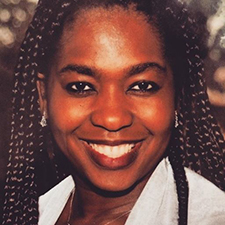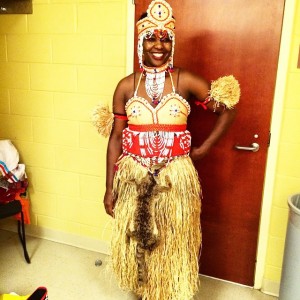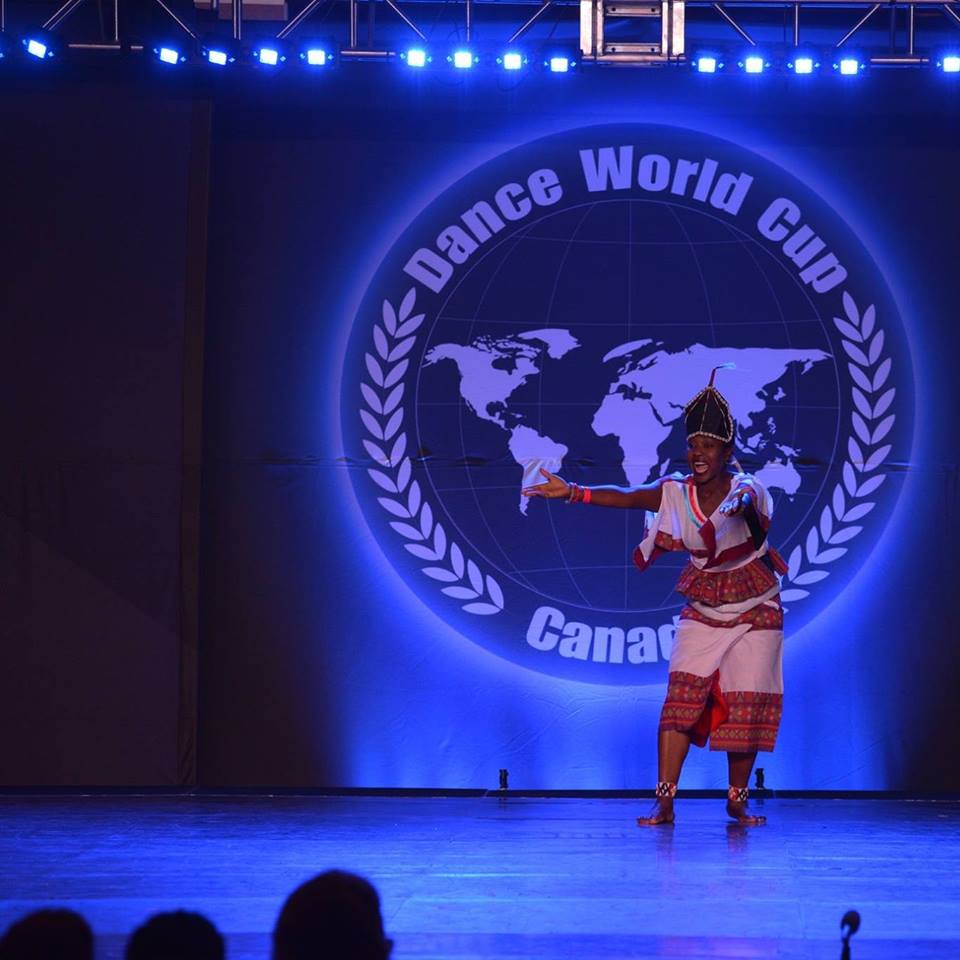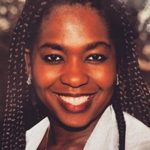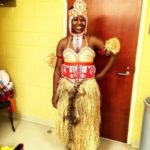Ramatu Afegbua-Sabbatt
Dr. Ramatu Afegbua-Sabbatt is a native of Idah in Kogi State, Nigeria, and a descendant of the Okpella tribe’s Royal Family of Afegbua. Ramatu got a young start in the fine arts when she began acting in state television programs in Nigeria at age 14. The particular famous pieces she performed in are Wedlock of the Gods, by Zulu Sofola, and The Gods Are Not to Blame by Ola Rotimi.
Dr. Afegbua-Sabbatt immigrated to the United States in 1988 and lives in Atlanta, Georgia. She is a University graduate with a degree in Business administration, a major in Marketing, and served in the mandatory undergraduate program in Nigeria as a high school teacher through the national youth service council (NYSC) for a year. She also holds a Diploma in Insurance and a Grade 11 Teachers Certificate in Education. Ms. Afegbua-Sabbatt graduated from Saint Leo University, Florida with a Master’s Degree in Business Administration in 2012.
Since 1988, she has influenced authenticity in African dance by performing with the leading cultural dance companies in metro Atlanta – Extensions of Africa, African Dance Connections, Uhuru Dancers, Barefoot Ballet Manya, Giwayen Mata, and in Ballethnic Dance Company’s signature production, Leopard’s Tale. Mrs. Afegbua-Sabbatt co-founded Barefoot Ballet Manya. As the founder of Giwayen Mata (translated from Hausa as “Elephant Leaders of the Women”), an all-female percussion ensemble, she broadened artistic expression for female artists by challenging the traditional practice of exclusively restricting drumming to male musicians.
Dr. Afegbua-Sabbatt is listed on the Fulton County Schools Teaching Museum artist roster, the Georgia Council for the Arts Teaching Artist Registry, and was a roster artist for Young Audiences/Woodruff Arts Center before its closing.
Mrs. Afegbua-Sabbatt is in her 17th year as an instructor in the Atlanta Ballet’s Dance Education Program at Fulton County’s West End Performing Arts Center.
Social Media: Instagram, Facebook, Twitter
Arts Disciplines: Dance, Percussion
Core Content Curriculum Areas: Theatre/Drama, English/Language Arts, Science, Physical Education, Music, Dance, Math, Social Studies/History, Foreign Language
Specialized Content Areas: Arts Integration, STEAM, World Cultures
Grade Levels: Pre-K, K-2, 3-5, 6-8, 9-12, University, Alternative Schools, Seniors
Program Types:
School-based Classroom Workshop(s), School-based Afterschool Program, School-based Assembly Program, School-based Residency Program, School-based Summer Program, Community-based Workshop(s)
Community-based Assembly Program, Community-based Afterschool Program, Community-based Residency Program, Community-based Summer Program
Online Content for School Use, Hybrid Online and In-Person Content for Schools, Hybrid Online and In-Person Content for Communities
Special Populations:At-Risk Students, BIPOC (Black, Indigenous, and People of Color) students, Exceptional Learners (students with disabilities as well as those who are gifted and talented
Pre-Service Learning and Professional Development:Professional Development for K-12 Teachers, Professional Development for Teaching Artists
Geographic Availability:Metro Atlanta, North Georgia, Middle Georgia, South Georgia
Program Fees:
- Performances: $525 for one performance, $775 for two performances, $1,300 for three shows, $1,550 for four shows, plus $0.58 per mile from the home office
- Workshops: $250 for one workshop (minimal requirement is 35 students for dance workshop, and 35 for drumming workshop, which can be run concurrently), $500 for two back-to-back workshops, $750 for three workshops
- Residencies: $300 per day, $1,500 per week
Artistic Profile:
Dr. Ramatu Afegbua-Sabbatt was born in Idah, Nigeria and earned an Associate Degree in Insurance in 1983 and a Bachelor of Science in Business Administration with a concentration in marketing from Ahmadu Bello University in Zaria, Nigeria. She received a Master’s in Business Administration from Saint Leo University, Tampa, Florida in 2012 and a Ph.D. from Omega Graduate School in Dayton, Tennessee in 2022. In 2018 she published as co-author with the International Journal of Management and Human Resources. Dr. Afegbua-Sabbatt single-handedly expanded the cross-cultural landscape on local and international levels when, in 1990, she founded the dynamic non-profit organization Manga African Dance and in 1991 founded Giwayen Mata, an all-women percussion group. She is the founder and CEO/Artistic Director of Manga African Dance, Inc. Her executive duties include coordinating and ensuring day to day operation of the organization, grant writing, and working closely with the Board in creating a strategic plan. Her artistic responsibilities include creating school programs, teaching dance classes, training artists, setting choreography, creating and performing in Both MADI’s concerts and collaborative concerts. In 2003 and 2006, MADI was featured Georgia State University’s “CELEBRATING A WORLD OF RHYTHM AND DANCE to present the music of south India, Native North America and Nigeria, and Brazil in Atlanta. From 2008 – 2016, she traveled with her husband and family as a US diplomat. The family was stationed in Haiti, Nigeria, and the Democratic Republic of Congo. As a U.S. diplomat she worked as a volunteer/leader of military spouses, an Assistant Consular, a Community Liaison Officer, a Teacher Coordinator, and a Management Assistant for individual U.S Embassies. In 2012, she founded a sister company MangaNiaja in Nigeria to expand international cross-cultural exchange. She has since spread the Rhythm in Motion concert around the globe, performing for the US Embassy of Haiti, and starting a Black History concert for the Embassy in Abuja, Nigeria, and Kinshasa, DRC. Dr. Afegbua-Sabbatt was featured in the opening and closing ceremonies of the 1996 Olympic Games. Continuously committed to community-based arts education, Dr. Afegbua-Sabbatt was with Young Audiences at the Woodruff Arts Center (YAWAC) for over 25 years before its closing. She has been an instructor with the Fulton County Schools Teaching Museum for more than 25 years and is presently on the Georgia Council for the Arts Teaching Artist Registry, teaches classes for the Fulton County Arts and Culture centers and the Atlanta Ballet Center for Dance Education. She taught at Gate City Heritage School for 28 years, Georgia State University for 8 years before going on sabbatical and resuming in 2019 to present. She has taught master dance workshops at Emory University, and Kennesaw State University, and has presented workshops at universities around Georgia and Florida. She is a member of the International Dance Council (CID) and has represented CID and Manga African Dance by performing as a solo artist in June-July of 2015 for the opening and closing of the World Dance Cup in Whistler, Vancouver, Canada.
Teaching Experience:
Dr. Afegbua-Sabbatt is a professional teacher with a Grade II Teachers’ certificate in education from Nigeria. Since 1992, she has been a teaching and performing artist with several arts organizations and agencies.
Innovative and Strategic Thinking
By establishing a partnership with the Adamsville Recreation Center Dr. Afegbua-Sabbatt strategically impacted Manga’s target audience through a 4-year “artist-in-residency including afterschool enrichment workshops for youth, weekly senior and community African dance and drum classes, and an annual Dance and drum conference started 2000 with the staging of the organization’s signature performance The Osun Festival 1998 to present.
Thought Leadership
Dr. Afegbua-Sabbatt began her campaign against childhood obesity more than 30 years ago teaching healthy living through dance. The Health is Wealth Fighting Obesity campaign targets at risk-youths. Through African dance and drumming, youth learn about traditional cultures while engaging in a calorie-burning aerobic form of exercise.
There were measurable results were generated as a result of Dr. Afegbua-Sabbatt’s innovative leadership including the impact her leadership had on the community affected. The specific challenges her efforts addressed follow.
In September 2000 students at Stone Mountain Charter School 6, 7 & 8th grades who werestruggling with math participated in African dance and drumming, a 3-week residency. Through dance, Dr. Afegbua-Sabbatt was able to engage students on the verge of expulsion in learning math concepts such as percentages, degrees, and fractions. In teaching African dance and drumming Dr. Afegbua-Sabbatt was able to simplify the concepts and make it fun to learn. Students were so invested in her teaching that they petitioned for Dr. Afegbua-Sabbatt to return for a two-year teaching tenure with the school. Over the course of two years, Dr. Afegbua-Sabbatt was able to influence student attitudes about learning, increased self-esteem, and forged school unity. Additionally, Dr. Afegbua-Sabbatt was able to implement a teacher training program that empowered teachers to successfully replicate the arts-infused concepts in math and science.
During her work at the U.S. Embassy in the Democratic Republic of Congo at the Congo American Language Institute she mentored 50 local artists into studying the English language at the institute.
The conditions, results, or situations that served as “the baseline” against which outcomes were compared: Middle school students were testing poorly in math and science prior to the artist residency beginning in September 2000. Teachers were challenged with how to make math and science interesting and engaging in the classroom. The residency was the school’s first experience with using the arts to teach its curriculum.
Some of the 50 artists graduated and others can communicate fluently in English and travel the world signing their own contracts with a better understanding of the content. Their international travels for artistic training or performance experience are enhanced. The experience was the first of its kind that was established in the Department of state, public diplomacy endeavor.
The efforts produced unanticipated results:
Dr. Afegbua-Sabbatt’s teaching style positively influenced the attitude of the Stone Mountain Charter School administration and its students in regard to the importance of the arts in education. Drumming and African dance became an integral part of general assemblies. Several students were inspired to pursue further education and careers in dance and music.
Sample Programs:
- Rhythm in Motion: The pulsating sounds of Sunu (ceremonial music played by the Malinke people of Guinea and Mali during traditional festivals) transport students to the villages of West Africa, where popular American dances such as the Charleston and popular hip-hop moves were born. Manga traces the evolution of these dances from the marketplaces of the Congo, to the slave ships bound for the Caribbean, to the plantations of the American South, and the nightclubs of the urban North. Students discover how Africans absorbed elements of other cultures along the way and transformed them into new dance styles that have left an indelible mark on American culture.
- Lokacin Wasa: Typical of many African dances, this program gives artistic expression to a common facet of Nigerian village life—playtime. The choreography combines the strong, energetic, rhythmic footwork and gestures of African dance with movements that communicate the unfettered joy of Nigerian children at play. Students enjoy comparing African games with their own and discovering the common threads that bind all the children of the world.
- Dance Drama: Manga delivers a captivating dance drama based on the story of a king who travels to another town. There he discovers that knowledge is power. The program opens with a powerful drum call announcing the king’s entrance, follows with a performance of the Lamba (a royal dance), and draws on the dancers’ movements to tell the rest of the tale. Through this storytelling, drumming, and dance, students gain an understanding of how African people preserve their heritage and pass it on to future generations.
Sample Lesson Plans/Study Guides:
- Listing ID: 6039
